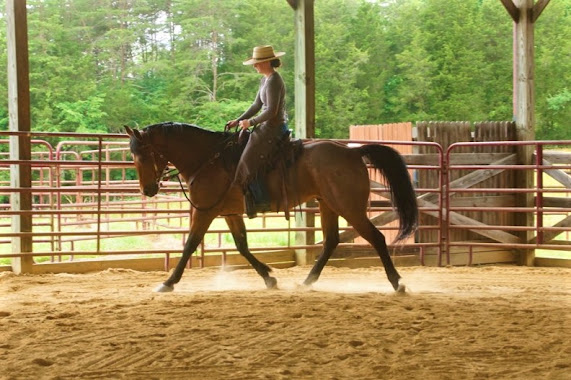Wedges of Wisdom: The Importance of Prepositions
I'll give you a minute to dig out your middle school grammar text (don't worry, I had to look it up, too.)
A preposition in grammatical terms is a word that governs a noun or pronoun. It expresses relation to another word or element in the sentence.
"The man stood on the train platform."
"There's some milk in the fridge."
"That saddle pad belongs to me."
There are a ton of prepositions, most of them just a few letters long. In horsemanship, there's two of particular interest: "to" and "for".*
These little words carry a lot of weight when it comes to describing the effect your actions have on the horse. Everything we do we either do to the horse or we do for the horse. The difference seems small until you think about the ramifications this has on your relationship.
To do something to someone means you perform an action upon them. Your action may have been invited or agreed upon but there's a certain unpleasantness to the nature of doing something to someone or something. There's also a level of emotional divorce from the situation. When I think of this word now, I get a mental picture of looking away in disgust or angst as I hold my nose to perform the task.
To do something for someone is still to perform the action but with a very different feeling. There is no emotional divorce: you're fully present and aware and thinking deeply of and for them (see what I did there?) When you do something for someone you are usually looking to help or somehow be of aid. You want to make things better. If there was one word that encompassed the mental image of extending a helping hand, the word "for" is the first that comes to mind.
I'm admittedly a huge word nerd. I love language and I place a great deal of importance on the idea of specificity of language. I've had conversations with students before about the idea that what you say carries great emotional weight: the easiest example is the use of harsh words to describe our animals. Calling your horse a "jerk" or an "ass" might seem innocent but those words carry tremendous energy. Since speech is a very large part of how we communicate that energy matters. Horses don't "speak" in traditional human terms but they sure as heck know how to read energy.
So when I'm working with any horse and I need to do something I will often pose the internal question, "am I doing this to the horse or for him?" This is especially important when what I'm doing is some sort of correction, or if I'm blocking a thought the horse is having a hard time letting go. I can make an incredibly firm correction and have it come from a place with zero ill feelings. I can block a horse's thought pretty vigorously and the horse will know whether I am doing it to him or for him. The difference between these two little words will determine how the horse ends up feeling afterwards, and that of course should be of great importance to anyone who works with these animals.
*Great thanks to Harry Whitney for this lesson. I cannot take credit for developing this idea, I'd just formatted the explanation for my own purposes.

Comments
Post a Comment